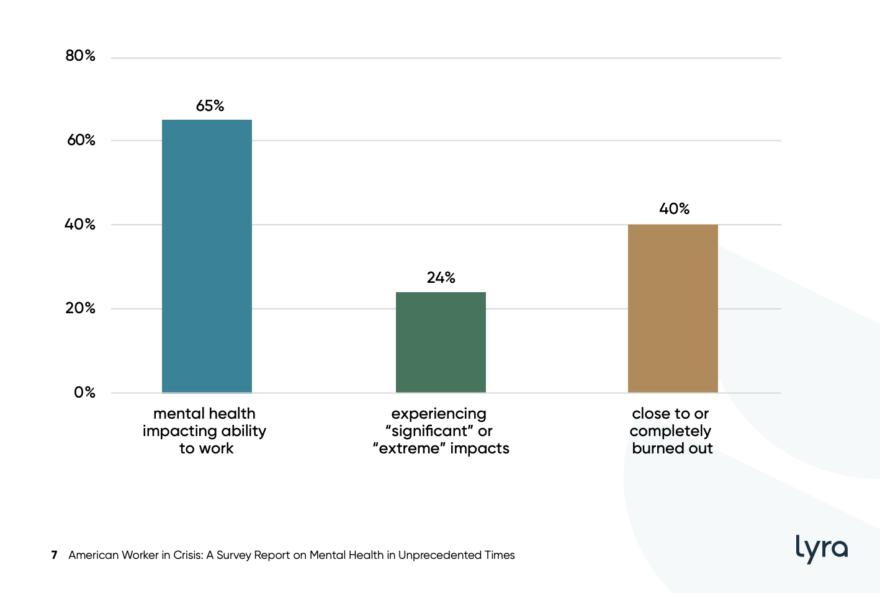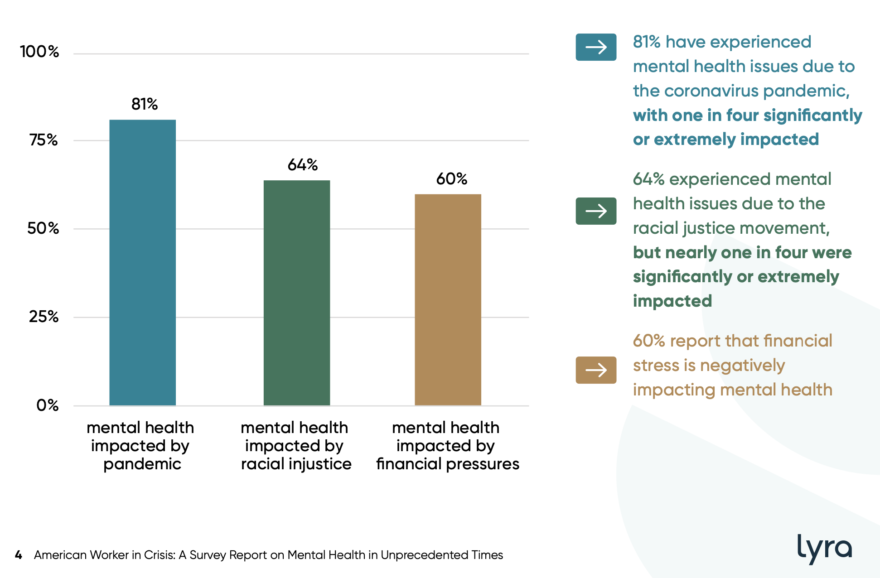
Just conduct a quick job search on Indeed.com using the term “mental health coach” and you’ll find over 203 results displayed. That number will likely double by the end of 2021, because the trend for mental health coaching is inevitably underway.
As behavior change experts, we health coaches find ourselves helping clients make connections between their dietary choices, physical activity, and their stress levels or mood. We may also support our clients in valuing self-care and experimenting with different strategies to incorporate more mindfulness, relaxation, and personal enjoyment into their daily lives.
Today, we’ll take a look at some key headlines and data on this industry trend, then talk scope of practice and best practices for health coaches working and integrating within the mental health and wellness sphere.
The Growing Industry Trend of Mental Health Coaching
Headlines left and right bring awareness to the psychological toll the worldwide pandemic has had on individuals’ and families’ mental well-being. In a 2020 survey by Lyra Health, where they surveyed 1,200 full-time U.S. employees, 81% of them reported mental health issues due to the coronavirus pandemic and/or the racial justice movement. 40% said they were close to burnout or already experiencing burnout.
Traditional insurance networks demonstrate a shortage of available and approved mental health providers, which leads people to seek non-traditional resources or to pay out of pocket for services. In comes mental health coaching within a collaborative care model at large that integrates experts ranging across many degrees on the healthcare spectrum.
Trendsetting Tech Companies Combine Mental Health Coaching with Therapy
Chipotle Mexican Grill partnered with Aduro to provide employees with integrated mental health coaching services. Aduro‘s new wellness platform cultivates a holistic, proactive, and inclusive approach to improve mental health among employees….”By offering access to a personal wellness coach, individualized content, and solutions for self-care, our goal is to foster a continual culture of wellbeing for all employees.”
In March, Prince Harry announced his new role as Chief Impact Officer for BetterUp coaching and mental health services. BetterUp connects workers with professional coaches, counselors, and mentors for one-on-one sessions (and they have a network of more than 2,000 coaches across the United States!).
Leading Services Aiding Mental Health with Wellness Coaching:
- Vida Health
- Lyra Health
- Ginger by Cigna
- BetterUp
- Aduro
- AbleTo
- Meru Health
- LIFE Ascent
Why Coaching for Mental Health?
Mental health influences how we think, feel, and act. It factors in our emotional, psychological and social wellness, and it affects how we handle stress and make choices in our day-to-day lives. These psychosocial elements, when unmanaged, become major risk factors for chronic disease, which is why stress management and mental health are inevitable topics for health coaches today.
Coaching can serve as the first level of support and a great complement to therapy.
“Coaches can provide members with day-to-day support between appointments. If a member works with a therapist or psychiatrist, a coach can help them maximize the benefit of their clinical treatment through ongoing check-ins, curated content, and more.” (Ginger)
Not everyone needs clinical intervention. One person’s mental health needs or challenges can vary widely from another, with some being lower on the spectrum where psychotherapy or licensed expertise is unnecessary. Consider, also, a person who’s had prior success with therapy and is in now a place where they can focus on sustainability and personal growth in support of their mental well-being.
“Unlike therapists, coaches don’t specialize in treating complex clinical problems. However, they do help clients manage emotions, challenge negative thinking patterns, improve relationship skills, and reduce stress and anxiety—all of which bolsters mental health.” (Lyra Health)
Health and wellness coaching works synergistically with therapy. The overlap between the skills and tools of health coaches and therapists is what causes some professionals to be confused regarding a health coach’s legal scope of practice.
Scope of Practice
Therapists are licensed to treat diagnosable disorders based on the Diagnostic and Statistical Manual of Mental Disorders (DSM-5). It’s important that coaches are vigilant in noticing issues that require the support of a licensed mental health provider.
Signs that your client requires the support of a licensed mental health practitioner:
- Client exhibits a decline in experiencing positive emotions
- Client exhibits an increase in hopelessness, or helplessness
- Client’s energy has changed, exhibiting states of hyper-alertness or excessive tiredness
- Changes in client behavior demonstrate impulsiveness, risk-taking, or substance abuse
- Client has thoughts of death or suicide
- Client experiences increased irritability or outbursts
- Client wants to process feelings repeatedly rather than moving forward toward learning and insight. (Arloski, 2013)
As a practicing health and wellness coach, I’ve noticed that many clients are seeing a therapist while also working with me as their coach. Some of the mental health topics they seek clinical support for include emotional eating, depression, ADHD, grieving the loss of a family member, childhood trauma, and more. In most cases, the therapist knows about the work I’m doing with the client, and vice versa. I do witness a synergistic effect from this multi-level support system.
One of my clients happens to be a licensed therapist. She has been seeing me as her health coach for a year while also seeing a therapist for deeper mental health support, and I appreciate this message she sent me acknowledging the benefits of coaching:
“One of the most appealing aspects of working with you as a health coach is the humanistic approach to health and wellness. I like that our communication isn’t stiff and I don’t feel like a patient with a disease…I also love that it doesn’t feel one size fits all. I think the way you do things is really effective.”
When it’s time to refer a client to a more qualified professional, it’s important for coaches to consider the client’s level of readiness. A certified health coach is trained at coaching people through the Stages of Change, from contemplation to preparation to action; meeting the client where they’re at; and helping them explore ambivalence or brainstorm actionable steps needed to make this change possible in their lives—especially if they’ve never worked with a mental health practitioner in the past.
If you’re interested in working with clients as a mental health coach, it’s important to stay up to date with the surely evolving scope of practice legislation—which will vary state by state in the US.
As unlicensed behavioral health practitioners, certified health coaches should always refer clients out to a licensed professional whenever client language or behavior suggests the need for therapy or psychotherapy services. It is also our responsibility as health coaches to inform clients of our scope of credentials and expertise, making clear that coaching services are not counseling or psychotherapy.
A Health Coach’s Role in Mental Health
In belonging to several virtual health coaching communities, I’ve noticed discussions about our scope of practice that are riddled with fear and misconceptions regarding what a coach is allowed to do in the realm of mental health support. I found it to be quite clarity-inducing when I read through the Job Task Analysis for Health and Wellness Coaches.
Certain tasks “are used throughout the Health and Wellness Coaching relationship and are the most central to the coaching process,” and the following official coaching tasks help bring clarity to some of the crossover duties shared between coaches and therapists:
Establish or identify the present situation, past history, previous successes and challenges, resources, etc. associated with the client’s vision [T-7].
Invite the client to identify and explore patterns, perspectives, and beliefs that may be limiting lasting change [T-9].
Health coaching is about wellness coaching at its core, and that means we look at a person holistically and support them in a holistic way. We observe and interact with our clients according to their most immediate motivations, interests, and concerns in a way that is unfailingly aligned with their personal wellness vision.
The competent and effective performance of Health and Wellness Coaching requires skills in stress management, self-care (for coach and client), enhancing self-efficacy, building positivity, building autonomy, reframing, time-management, self-management, setting boundaries, and many more.
We also serve as an important element of social support, encouraging them to explore ways to acquire more positive social support, practice self-compassion and positive self-talk, set and pursue wellness goals, learn to self-monitor their actions and feelings, prioritize their mental well-being, and to understand the relationship between mental health, stress, and physical health or disease states.
You can see how mental health plays an enormous role in the health coaching relationship and in your clients’ ability to make and sustain behavior change. Together we are witnessing the rising demand for integrated health services as the world places greater importance on mental health and stress resilience—and certified health coaches play an essential role in this societal evolution.





